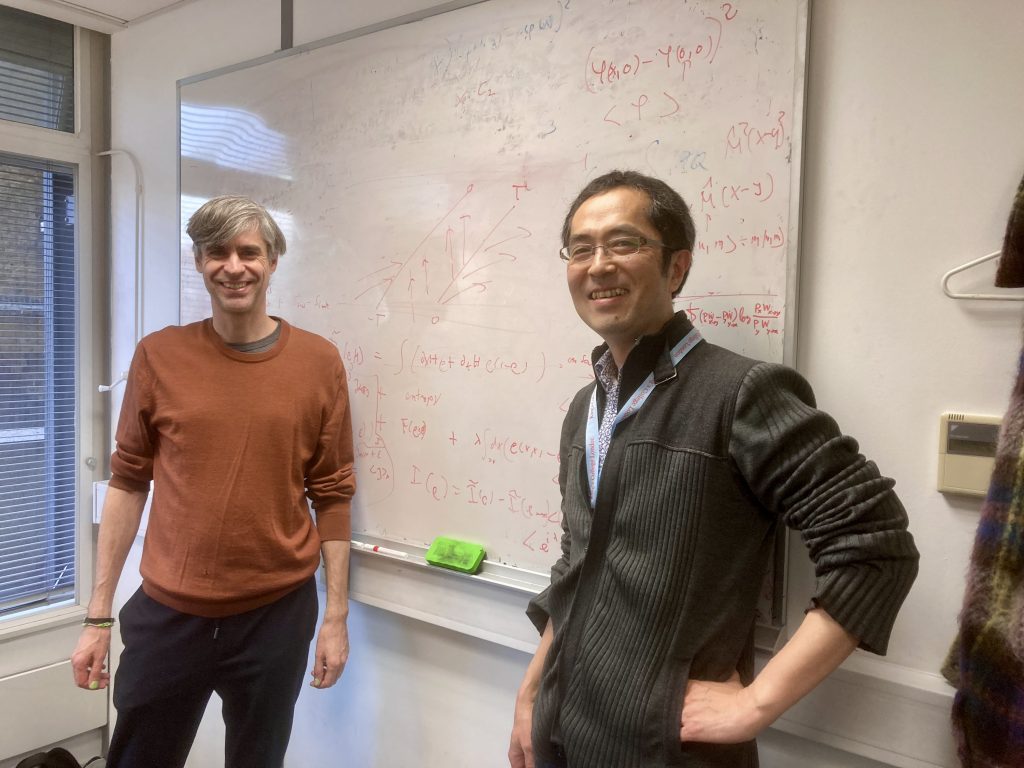2024.03.11
【WRH】 Professor Tomohiro Sasamoto visited King’s College in London
Professor Tomohiro Sasamoto has returned from two months stay in London supported by the WRH Faculty Research Abroad Program. This is a report on the activities and results of his stay.

Professor Benjamin Doyon(left), Professor Sasamoto(right)
| Awardee | Tomohiro Sasamoto, Professor, School of Science |
| Destination | King’s College |
| City and Country | London, England |
| Name and Position of Host Researcher | Professor Benjamin Doyon |
| Travel Period | 2023/12/12 – 2024/02/16 (2 months) |
| Project Title | Fluctuations of non-equilibrium many-body systems with symmetries |
From December 12, 2023 to February 16, 2024, I visited Professor Benjamin Doyon at King’s College London (UK) and conducted joint research with him on the theme of “Study of fluctuations in non-equilibrium many-body systems with high symmetry.” Professor Doyon is a researcher who was invited to our university in October 2019 using our university’s “expenses to support the employment of foreign faculty in conjunction with the opening of English classes.” After that, we started joint research and finished writing the first joint paper in 2022[1]. The purpose of the joint research during this stay was to develop that research in several directions.
Through close discussions over a period of more than two months, we were able to advance our research on several issues that could not be addressed in the 2022 paper [1]. For example, in paper [1], we were not able to deal with the situation where shock waves exist, but during our stay, we were able to obtain a basic understanding of this situation by studying in detail the case where shock waves exist in a one-component system. After deepening and clarifying this understanding, we plan to develop the theory into a general theory that includes multi-component systems. We also recognized that it would be beneficial to discuss the single-component systems in detail within the general scheme of paper [1]. We already began preparing a paper on the subject.
In paper [1], we developed a theory of large fluctuations called large deviations, but there are cases where specific fluctuations called KPZ fluctuations exist, depending on the nonlinearity of the system. During my stay in UK, we also conducted preliminary research to incorporate such peculiar fluctuations into the general theory. In particular, we compared several different methods for dealing with the basic model equation called the KPZ equation in order to understand the mechanism by which singular fluctuations appear. Although a clear understanding cannot be said to have been reached at this point, the issues to be solved have become quite clear and will be continued be studied in near future.
During discussions with members of Professor Doyon’s laboratory, we also realized the possibility that large deviation theory, as treated in paper [1], is related to game theory, which at first glance seems to be completely unrelated. As a result, we found that some concepts known from game theory may be useful for understanding the properties of nonequilibrium many-body systems. At this point, our understanding is limited to a few similarities of the known properties, but we expect that the connection will become clearer by examining them in concrete examples.
We also discussed the usefulness of investigating the properties of two-component systems in detail, developing a general theory of peculiar Gaussian fluctuations in systems with many conserved quantities, and examining the theory at low temperatures when quantum properties are in effect.
Although we did not reach the point of completing a paper during my stay, we will keep in touch with each other in the future, and aim to publish papers on our research.
[1] B. Doyon, G. Perfetto, T. Sasamoto, T. Yoshimura, Ballistic macroscopic fluctuation theory, SciPost Phys. 15, 136 (2023)
Related links:
– World Research Hub (WRH) Program

